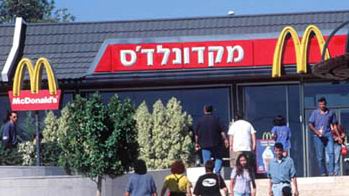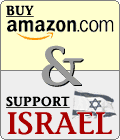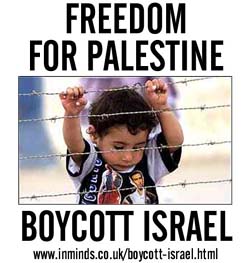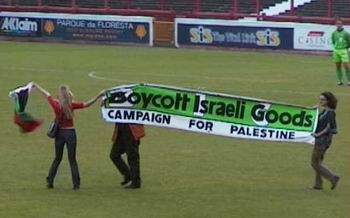|
BOYCOTT ISRAEL CAMPAIGN
|
Boycott Israel
Frequently Asked Questions
1. What is the boycott?
The boycott of Israeli products and companies supporting the zionist entity is about ordinary people around the world using their right to choose what they buy in order to help bring about an end to oppression in Palestine. Its a peaceful means of putting international pressure on the racist state of Israel and follows in the footsteps of the successful boycott against South African racist apartheid.
2. Are you boycotting all Jews?
Certainly not! The boycott is not directed at any religious or ethnic group, but rather it is directed at those companies that are supporting the racist occupation of Palestine. A quick glance at the boycott list will testify to this. We do not discriminate between the supporters of Israel - if a Muslim company is caught collaborating with Israel we will boycott it just as vigorously as any other company.
3. Who supports the boycott, what do our Ulema say about it?
People of good conscience all around the world support the boycott.
Trade Unions around the world, including the UKs biggest trade union UNISON with its 1.4 million members, have called for a boycott of all Israeli goods. Christian groups like Christian Aid have joined the boycott demanding an end to EU - Israel trade agreements. And Jewish groups such as B'Tselem and Gush Shalom have launched their own boycott Israeli goods campaigns.
Among Muslims, every leading Ulema from every school of thought is united in this and has given clear fatwas in support of the boycott. A few examples from different schools of thought are provided on the following page:
http://www.inminds. co.uk/boycott- fatwas.html
4. Are you sure these companies support Israel?
Many people wanting to boycott Israeli products and companies supporting the zionist entity have been frustrated with the lack of accurate information as to which companies to boycott.
To this end we have carried out extensive research to identify the guilty companies. All our findings are backed with references so that you can independently check the facts and understand exactly how each company is contributing its support to Israel.
On our website we have dedicated a whole page per company. Each page is divided into three sections -
(1) the company's product list,
(2) research findings and
(3) reference/additiona l info section.
You can see the evidence against a company given in the research findings section and next to each piece of evidence is a reference number which you can look up in the reference section to find out the source for the evidence - most items are sourced back to Israel's own newspapers and journals.
5. Surely wherever we spend our money, even our taxes support Israel, so why pick on these companies?
Whilst it is true that the cancerous zionist entity has got its tentacles hooked into numerous markets and economies - sucking each one to nourish itself, but this is no excuse for us not to do anything. The companies on our list are chosen for being the major supporters of Israel - those that Israel itself has honoured and bestowed awards upon in recognition of being its key supporters in the world. If we can successfully campaign against these then the support of the others will, inshallah, evaporate.
6. These companies operate in Muslim countries providing Muslims with Jobs - isn't boycotting them going to harm ourselves?
It is true that most of the companies on the list have operations in Muslim countries and employ Muslims who would loose their jobs if the companies collapsed or pulled out. But we have to look at this as a opportunity, not a loss.
Take the example of Coca-Cola in the middle east, the boycott has hit them so hard that their sales are down 60%. This has created an opportunity for a Muslim alternative, ZamZam Cola of Iran, which is owned by the religious charity the Foundation of the Dispossessed, to take Coca-Colas share of the market. Zam Zam Cola is struggling to keep up with demand - it exceeded all expectations by selling four million cans in its first week. It is now planning to expand by build factories in the gulf states, helping provide local employment. And for the first time even European countries like Denmark, are importing ZamZam Cola.
Similar success stories can be told of Sainsburys closer in Egypt in April 2001, which resulted in a blossoming of local stores which would not have otherwise survived in an unfair market monopolised by a foreign giant.
Also lets not forget that the reason why the multinationals have set up in Muslim countries is not out of benevolence for us, but rather exploitation. Take the example of Delta Galil - the Israeli textile giant whos cloths are sold under the labels GAP, Banana Republic, Calvin Klein, BOSS, M&S and DKNY among others. The Israeli company has factories in Jordan and Egypt in addition to Palestine. Their treatment of workers is such that Sweatshop Watch has denounced Delta-Galils exploitation of Arab labour, calling it a "Sweatshop Czar". Is it really a loss to us to see such companies go?
7. Does the boycott work?
Oh yes! For example, one of the companies hardest hit by the boycott is McDonalds.
McDonalds is a "major corporate partner" of the Jewish United Fund. In its own words, the Jewish United Fund "works to maintain American military, economic and diplomatic support for Israel; monitors and, when necessary, responds to media coverage of Israel." Also, McDonalds chairman and CEO Jack M. Greenberg is a honorary director of the American-Israel Chamber of Commerce and Industry.
 McDonalds has 80 resturants in israel, McDonalds has 80 resturants in israel,
providing employment to 3000 israelis.
In the face of giants like McDonalds crumbling under the pressure of the boycott, smaller companies are weary of supporting Israel and are steering clear in fear of being boycotted.
Amidst calls for a boycott of Amazon.com, the internet bookstore Amazon.com terminated its association with the Jerusalem Post (Nov 2002). It was revealed that the Jerusalem Post was donating its slice of the profits derived from the amazon.com partnership to Israeli soldiers returning home after committing massacres and other abuses of human rights on the occupied territories.
| Their advert, which appeared on most of their pages, read "Buy Amazon.com & Support Israel". Inundated with complaints, amazon.com severed its ties to the Jerusalem Post, demanding they remove all the adverts and vowed not to hand over any more profits. |
 | Other companies, disgusted by Israel's treatment of the Palestinians have themselves actively joined the boycott.
In May 2002 a US auto part export company refused to do business with Israel.
In a reply to a purchase order from Israel, John Harris, representing Texas Automotive Export wrote:
"We must inform you that Texas Export will not do business with Israeli citizens at this time. We urge you to rein in your military and stop your oppression of the Palestinian people," the letter said. "Your country has lost the respect of the civilised world," it concluded.
The success of the boycott has so worried the US government and Israel, both afraid that companies will abandon Israel, that just last week the US threatened to fine US companies that take part in the boycott. The Department of Commerce has already issued more than $26m in fines and turned down export licences to those companies found supporting the boycott - so much for democracy and a right to choose who to do business with!
8. Can the boycott really effect the Israeli economy?
Israel's economy is on the verge of total collapse with no sign of recovery despite cash injections from uncle Sam. Just last month (Oct 2002) Sharon begged Washington for $10 billion in emergency aid. Inflation is sky rocketing - even the official figure is over 4 times the government target. VAT has just been raised as have fuel bills and all basic living costs like food and rents. Unemployment is soaring and salary cuts are the order of the day.
This has resulted in a series of crippling general strikes - the last one bringing the country to a standstill - flight in and out of Israel had to be suspended, radio and television broadcasts stopped and health workers only dealt with emergencies. The streets are piling up with uncollected garbage.
Foreign investment, a life-line for the zionist state, has also dried up. Figures reveal that investors have lost $5 billion of the $6.5 billion invested in Israel between 1999-2001. No one is prepared to invest any more.
The Israeli government is so short of money that its cost cutting includes shutting down several embassies and consulates around the world!
At this critical time, the importance of the global boycott of Israel and of the collaborating companies that give it its life-line cannot be overemphasised. Israel is counting every penny - every penny matters - ensure yours don't go to Israel!
9. Is there a printable list of the companies and brands to boycott?
Yes there is a leaflet designed for printing available for download on the following page:
http://www.inminds. co.uk/boycott- leaflet.html
Also there is an e-card with the logos of the companies to boycott which you can send to all your friends. Its available at the Islamic Card Centre:
http://www.inminds. co.uk/cardcentre .html
10. What else can I do to help?
1. Tell Others
Its essential that others know about the boycott and specifically which companies to boycott. Make a point of printing a 100 copies of the leaflet mentioned above[8] and give them out in your community - at Jummah prayers or other gatherings. Talk to people about the boycott, with non-Muslims draw the parallels between this boycott and the one against apartheid in South Africa.
We are grateful to the many individuals and groups around the world who have already helped in spreading the boycott. A few examples come to mind:
- A Muslim group in Bosnia carried out a huge poster and leaflet campaign, with activists distributing 40,000 leaflets in Austria, Bosnia-Herzegovina and parts of Yugoslavia. Their success has drawn the attention of the zionist Simon Wiesenthal Centre [April 2002].
- Just recently [December 2002] a similar leaflet campaign advertising our website and the boycott has been carried out in Australia resulting in newspapers articles and tv and radio coverage - we have been labelled as "preaching anti-globalisation" by one paper!
- In Hong Kong a boycott advert with our website has been placed in one of the Chinese newspapers. A reader sent us a copy.
- Crescent International have been placing, without cost to us, boycott adverts with our web address in most issues of their paper. They even designed the advert themselves - we only found out when we received our copy of the paper.
- A few Muslims in Birmingham got together and paid for the printing of 10,000 colour boycott leaflets (which they approached us to design). The leaflets were distributed through out the UK.
- One school has seen the importance of the role of children in keeping a family away from boycotted products, and has taken the initiative of giving each of its 500 pupils a copy of our boycott leaflet.
- Many Muslim and non-Muslim websites now carry our banner and boycott news ticker.
2. Write Letters
For a boycott to be effective, it must be followed up with a letter writing campaign to inform the companies that we are boycotting their products until they stop collaborating with Israel. See our letter writing campaign page for sample letters and advise of letter writing.
http://www.inminds. co.uk/boycott- letter-campaign. html
3. Picket
More and more individuals are beginning to take direct action against companies that support Israel. On form of direct action is to picket the guilty companies.
| Picketing is a form of public protest and aims to draw attention to the realities of Palestinian suffering by exposing those that help to sustain it. It embarrasses those shoppers that know they shouldn't be shopping there, informs those shoppers that are not aware of the moral objections as well as irritating supporters of Israel generally. |
 | The companies themselves become aware of the protests and news of pickets goes all the way to the top. See our guide on picketing to find out if there a picket near you and how to join it. The guide also includes tips on setting up your own picket and legal FAQ on what your rights are when picketing.
http://www.inminds. com/picket- page.html
4. Other boycotts
The boycott of Israel is much more than just an economic boycott. Support the sports and cultural boycotts. For more information see:
Cultural Boycott:
http://www.inminds. com/cultural- boycott-of- israel.html
Sports Boycott:
http://www.inminds. com/sports- boycott-of- israel.html

Sports Boycott in action - activists liberate the pitch!At a recent Scotland Vs Israel football match it was revealed
that 21 of the 22 man israeli football squad were serving soldiers,
no doubt war criminals returning from Jenin. SAROSH |
|